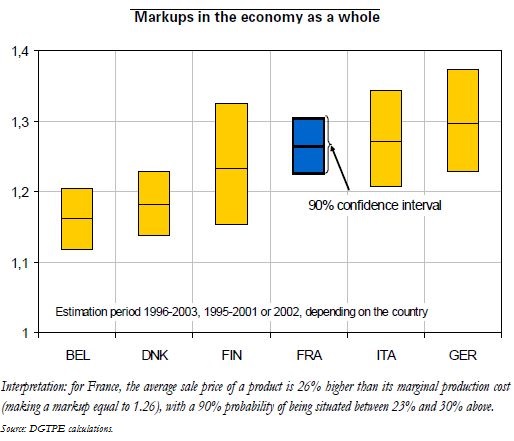Trésor-Economics No. 27 - Competition within sectors in France
Relative lack of competition is regularly pointed out as a main factor behind weak economic growth. In this study, we build an indicator measuring competition in a given sector of the economy. We then give an estimation of the potential gain in growth and jobs resulting from an alignment of competition in certain sectors with that observed in the best-performing European countries.
We can assess the intensity of competition by estimating the markup, defined as the ratio between the sale price and the cost of producing an additional unit of the product (the marginal cost). Based on estimations made for a group of European countries, the markup for the French economy is reckoned to lie within the European average and slightly below the estimated markups in Germany and Italy.
Competition is very strong in certain sectors producing non-internationally tradable goods (i.e. "sheltered" sectors). For example, the construction sector, which accounted for around 8% of the traded economy in terms of value added in 2004, appears to be highly competitive despite being sheltered from international competition.
In the light of our markup indicator, three main sectors of the French economy-retailing, hotels, and financial intermediation-nevertheless appear to contain scope for significantly increased competition.
An increase in competition in these three sectors to levels close to those observed in countries where competition is strongest could ultimately boost French GDP (excluding non-traded activities) by a figure on the order of 1.2% and create 200,000 to 250,000 jobs, depending on whether one includes the restaurant sector or not. The impact of these reforms on GDP might even be under-estimated insofar as the positive impact of more intense competition on innovation is left out of account.
